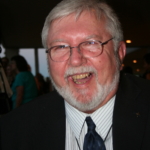By Tom Acey (Guest Blogger — an occasional, supplemental blog on living a life of joy)
Previously we learned that
Joy is a state of being
and that joy is NOT synonymous with happiness. Being joyful is the foremost manifestation of the power of Christ’s love working within our lives. We also discussed the “steps” outlined by Pastor Max  Lucado in his book, The Applause of Heaven. These are necessary to make the life-transformation that leads us to joyful living. Today we address the first of those steps:
Lucado in his book, The Applause of Heaven. These are necessary to make the life-transformation that leads us to joyful living. Today we address the first of those steps:
Recognize that we’re in need of a “reconstruction.”
As a recovering alcoholic, I am well familiar with the principles and actions proposed by Lucado. They are fundamental, essential and should be approached in the order he sets forth.
The Need for Reconstruction
In May 1981, I came face to face with my addiction and my absolute need for “reconstruction.” I had to admit that I was powerless over my circumstances and that my life had become totally unmanageable. Many of you will be familiar with the concept of a Twelve Step Program and recognize the terminology employed.
But, you might ask, “How does that apply to my life as a Christian searching for joy?” It applies in a number of ways.
- The Road to Joy is littered with obstacles placed there during earlier times within our lives, from childhood to present day. These I will refer to as “bad habits” and “limiting beliefs.” So entrenched are these obstacles that we are often not consciously aware of their existence. Or, if we are aware, we deny them in our conscious mind.
- Most of us grew up with the American cultural conviction that we are in, or must be in, control of every aspect of our lives. We all are familiar with such phrases as “a self-made man,” or “pulling ourselves up by our own bootstraps.” Many, if not most of us, have read books or attended seminars by well-known lifestyle gurus promoting their version of “personal growth.”
- Because of these beliefs, we have great difficulty admitting that we are powerless over anything in life. In particular, we feel this way regarding our own behaviors and circumstances. But the fundamental reality is that until we can admit to being powerless, we do not incur a sense of urgency about self-reconstruction.
- We also have to recognize and admit that our lives have become unmanageable. Once again, as self-controlling beings, we believe this is seen by others as another admission of failure. But it is the farthest thing from the actual truth. As Christians, it becomes even more difficult because we see it as an admission that our own faith is weak.
Taking Action
If you haven’t already done so, I urge you to start the process by doing some honest soul searching. Spend time in prayer and then write down the following:
- The things in your life that are causing you difficulty: spiritual, mental and physical. They may be such things as resentments, financial difficulties, relationship problems, job dissatisfaction, feeling a spiritual disconnect from church or God or both, procrastination, health issues, loneliness, depression or anxiety.
- What are your three greatest temptations? What are the things that come up again and again that clearly knock you off the path to joy? Sometimes these habits and limiting beliefs are obvious to us — we have a long and tortured history of battling with them. But sometimes they are more subtle and require a careful consideration to see where we have been deluding ourselves.
- What aspects of your life have become “unmanageable” as a result of these things? How have our lives been impacted in large and small ways by the answers to question two? How have our goals been disrupted and our relationships impacted by giving into those temptations?
- How does each of these things cause a separation within your relationship with God? As Christians we know that God desires good things for us, but how have our responses to these temptations kept us from the good that God has planned? How do we miss opportunities to grow closer to God because of our deference to these distractions? How do they lead us to patterns of deception and destructive behavior?
The Bottom Line
An acknowledgment that the reconstruction necessary for attaining joy cannot begin until we have achieved a sense of urgency about our lives. This leads to a motivation for making the positive steps necessary to “get ourselves back on track.” If we take the time and effort to examine ourselves, we will surely recognize the areas within our lives that are in a current state of disorder. So what to we do about it? Don’t panic (yet), you’re actually well on the road to where you should be. But the next step is both daunting and empowering. (We’ll cover that in “Getting There, Part II.”}
(This week’s blog was brought to you by Tom Acey of the Awakening the Joy Within© program. You can read Tom’s bio below. If you would like to read more of his compelling story, receive Tom’s weekly blog, and/or get more information about the Awakening the Joy Within© program and other programs from Joy Now, Inc, please visit www.livejoynow.com.
Tom Acey, the founder of Joy Now, Inc., is an experienced creator and facilitator of transformational workshops and trainings. He ventured into faith-based workshops with his Awakening the Joy Within© program, which focuses on freeing believers from limiting beliefs and  habits that prevent them from experiencing true joy and living joyfully to the glory of God. Through the programs of Joy Now, Inc, Tom’s mission in life is to carry the message of the Good News of Jesus Christ to Christians and non-Christians alike to awaken the joy within them so that they may reflect that joy to the world around them.
habits that prevent them from experiencing true joy and living joyfully to the glory of God. Through the programs of Joy Now, Inc, Tom’s mission in life is to carry the message of the Good News of Jesus Christ to Christians and non-Christians alike to awaken the joy within them so that they may reflect that joy to the world around them.







Leave A Comment